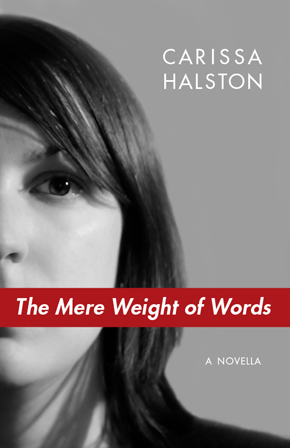‘Mere But Mighty’
Jaime Groetsema
 Carissa Halston, “The Mere Weight of Words”
Carissa Halston, “The Mere Weight of Words”
Aqueous Books, New Orleans, LA
2012, 118 pages, Print, $14
Carissa Halson‘s recently published novella, “The Mere Weight of Words” (Aqueous Books, 2012) is an exciting addition to her body of work. Halston deliberately gives her readers a work that is sharp and complex with beautiful linguistic details that are complemented by narrative moments of heartbreak and sorrow.
“The Mere Weight of Words” is Halston’s second piece of longer fiction. The first, “A Girl Named Charlie Lester,” published with Aforementioned Productions in 2007, reminds us that Halston is no stranger to depicting dark or emotionally troubling events. Charlie Lester, a disadvantaged youth, doesn’t know whether her parents are alive or dead—her belief for either case relies solely on disparate flashbacks in which she remembers them in either circumstance.
Similarly, in her new novella, “The Mere Weight of Words,” Halston depicts emotionally troubling events. The main character Meredith, or Mere, finds the most difficulty in connecting emotionally with her abusive, cheating, and ultimately, absent father. At the same time she is incapable of physically distancing herself from him, offering to meet him at his home after the divorce and accepting his invitation for lunch when he comes to visit her at school. Meredith’s actions are due to her desire to, literally, find her own voice.
Meredith’s desire manifests itself in her actions: she moves out of the house and studies to become a phonetician, maintaining a close relationship with her mother, while fearing the next time she might talk to her father. And though these scenarios may seem to be those that describe a typical adolescent drama, as the building of events heavily prioritizes Meredith’s self-reflection and growth, Halston pushes the boundaries by capturing pieces of Meredith’s adulthood—the trip to China, her emotionally-troubling and almost-abusive sexual relationship—and subsequent final run-in with her father.
Halston’s narrative largely deals with, and most clearly articulates, coming-of-age situations, but introduces layers of complexity, most skillfully by her consistent use of word play. For example, she intentionally utilizes ‘mere’, the adjective meaning both small and inconsequential, as a nickname for ‘Meredith’ given her by her father, but also to further emphasize Meredith’s own psychological state.
I longed for a place where my father mattered significantly less, one where I wouldn’t be so often reminded of his ever-present influence on my life…Who was I without my father? My father named me…[he] chose Meredith, from which I culled Mere…Only what it is said to be. I chose this adjective eons ago, as mine to shoulder when nothing else suited me. How fitting that I wrought such a name from my father (32-33)
Such instances are largely compelling and add additional depth through language.
In “The Mere Weight of Words,” Carissa Halston’s words punctuate. They weave intricate and subtle narratives and cast long, dark shadows; her words build intimate and complex characters that will resound emotionally with readers—a text for compassionate wordsmiths who don’t mind delving into a cacophony of emotional duress.

Jaime Groetsema, Reviews Editor

Carissa is also a previous contributor to Newfound. You can read her story “Sacramento, 2006” here: http://www.newfoundjournal.org/archives/volume-3/issue-2/fiction-halston/